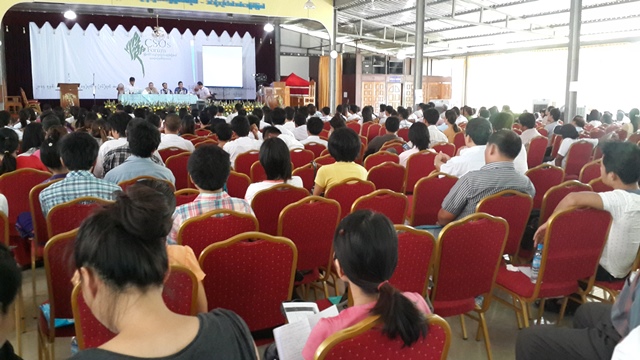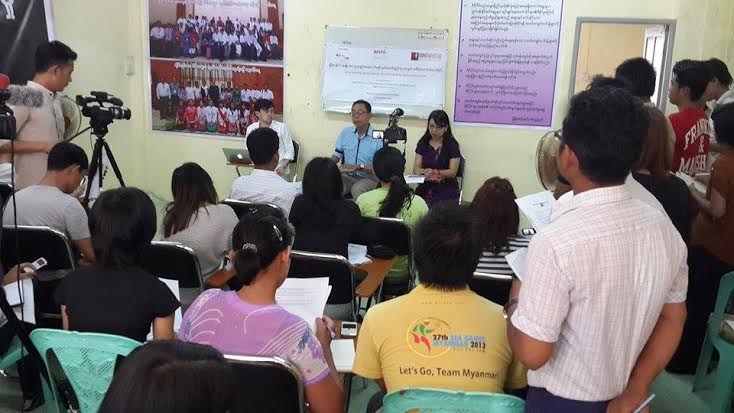Posts Tagged ‘Paris Principles’ (4 found)
Over 650 Myanmar/Burma Civil Society Actors Speak Out on the Reality of the Transition
 The forum titled, “Civil Societies’ Review on Myanmar/Burma’s Transition Process: Prospects for 2015 and Beyond”, held on 15 – 17 October 2014 at the Myanmar Christian Fellowship of the Blind Center in Rangoon, brought together over 650 representatives from 257 organizations and networks from across the country and border areas to discuss and strategize a wide range of key issues currently facing Burma in the context of the recent economic and political reforms since 2011. This is the first forum of this scale to assess the reform and the wide range of problems currently facing Burma.
The forum titled, “Civil Societies’ Review on Myanmar/Burma’s Transition Process: Prospects for 2015 and Beyond”, held on 15 – 17 October 2014 at the Myanmar Christian Fellowship of the Blind Center in Rangoon, brought together over 650 representatives from 257 organizations and networks from across the country and border areas to discuss and strategize a wide range of key issues currently facing Burma in the context of the recent economic and political reforms since 2011. This is the first forum of this scale to assess the reform and the wide range of problems currently facing Burma.
Despite the hailed “transition to democracy,” exalted particularly by the international community, civil society organizations (CSOs) spoke of the decades old challenges that remain unresolved, the stagnation of the reform process, and new emerging issues, in addition to the need for meaningful inclusion of the voices of civil society, democratic opposition forces, ethnic peoples, women and youth in the reform process.
The forum addressed six core issues; (1) law reform, (2) peace and conflict, (3) media, hate speech and communal violence, (4) Parliament, Government and accountability, (5) economic reform and foreign direct investment, and (6) the international community’s role and involvement, which were discussed under six panel discussions and six workshops. The forum produced a statement that gave concrete recommendations from civil society groups to the Burma Government, United Nations, international governments and international non-governmental organizations (lNGOs) […]
• • •The Myanmar National Human Rights Commission Continues Failing to Deliver
 A report authored by Burma Partnership and Equality Myanmar was launched on 25 September 2014 in Rangoon revealing the continuing ineffectiveness of the Myanmar National Human Rights Commission (MNHRC) as well as the lack of independence from the government. The report was launched on the same day that a reshuffle of the members of MNHRC was announced by the government, which came as a complete surprise to civil society organizations due to the lack of consultation.
A report authored by Burma Partnership and Equality Myanmar was launched on 25 September 2014 in Rangoon revealing the continuing ineffectiveness of the Myanmar National Human Rights Commission (MNHRC) as well as the lack of independence from the government. The report was launched on the same day that a reshuffle of the members of MNHRC was announced by the government, which came as a complete surprise to civil society organizations due to the lack of consultation.
Released at the Myanmar Journalists Network in Rangoon, Burma: All the President’s Men, contributed to the annual Asian NGO Network on National Human Rights Institutions (ANNI) Report on the Performance and Establishment of National Human Rights Institutions in Asia (2014). The report analyzes the Myanmar National Human Rights Commission Law 2014 enacted in March this year (enabling law) that institutionalizes the mandate of the MNHRC. The report finds that the law does not guarantee independence from the government and in particular, the president’s office. In contravention of international standards on national human rights institutions, namely the Paris Principles, the selection process does not adequately consult with civil society. As the report points out, “It is up to the selection board to come up with procedures for short-listing candidates, yet the enabling law itself should set out the process/procedure for selection, with consultations with civil society.” The members of the MNHRC are actually chosen by a selection board of ten, five of which are from the government or are government-affiliated. The enabling law states that two members of this board are to come from civil society organizations and a further two are to be MP, yet there is no transparency regarding the procedures under which the two MPs are chosen. Additionally, the chosen civil society members to the selection board are restricted to registered civil society only, thus excluding many outspoken and critical political and human rights groups who feel they cannot register under the current climate […]
• • •Roundtable Considers Founding Legislation for Myanmar NHRI
The APF was invited to Yangon in January to take part in a roundtable discussion on draft legislation to formally establish the Myanmar National Human Rights Commission.
The two-day meeting was attended by Commission members, along with representatives of government departments, the Office of the President, the Office of the United Nations High Commissioner for Human Rights and the APF’s Legal Counsel, Greg Heesom […]
• • •Burma’s NHRC: An Empty Gesture (updated version)
The international community should not welcome the creation of Burma’s NHRC until it complies with the Paris Principles
On 5 September, Burma’s regime announced that it had established a National Human Rights Commission (NHRC) charged with promoting and safeguarding the fundamental rights of citizens in accordance with the 2008 Constitution.
While the creation of a NHRC could be seen as a positive step, it should be welcomed with skepticism […]
• • •








 All posts
All posts